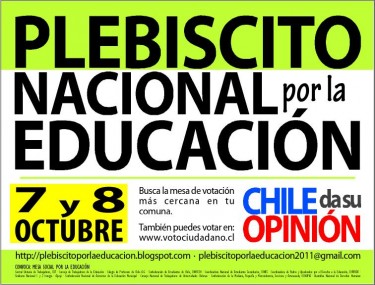After five months of protests and school takeovers, Chile’s student movement continues to mobilize for an overhaul of the country’s education system.
Last week negotiation talks between students and the government failed, but despite this recent setback, over the weekend an overwhelming majority of Chileans voted in favor of education reform in an unofficial plebiscite.
According to results released today, October 12, 2011, by the Colegio de Profesores [es] – the teacher's union that promoted the symbolic plebiscite – if results for all questions are averaged, 87.75% voted “Yes”, and 11.2% voted “No”. A detailed report of the responses to each of the plebiscite's four questions can be found on the Colegio de Profesores website [es].
English news site I Love Chile translated the plebiscite’s questions:
“Would you agree with a free public education of quality at all levels guaranteed by the state?”
“Would you agree to the de-municipalization of schools and colleges from the ‘Ministerio de Educación’ [to make the system more] participatory and autonomous?”
“Would you agree that it should be prohibited in all levels of education in Chile to gain profit from public funds?”
“Would you agree with the need to incorporate a ‘Plebiscito vinculante’ called by the citizens, to solve the fundamental problems of national character?”
On Twitter netizens commented on the plebiscite with the hashtags #Plebiscitoporlaeducacion or #PlebiscitoporEducación (both meaning “plebiscite for education”).
On October 7, Paula Mendoza (@PaulaMendoza) shared a picture and reported:
En primeros 20 minutos ya han votado 19 personas en Pza Ñuñoa #plebiscitoporlaeducación
Some users, like @Michi_kito and Giuseppe Leita (@geppe21), wondered why the plebiscite didn't include a question about teacher evaluations. The latter wrote:
¿Por qué en el #PlebiscitoPorLaEducación no pusieron sobre la evaluación docente si eso tiene que ver DIRECTAMENTE?
User @elgustavolutz said:
Las prrguntas del #plebiscitoporeducacionson tan obvias que es imposible votar no, todos quieren que mejore la educacion.
Danae Prado (@danaepc) responded to the criticism:
Esta claro q es + facil eludir el ejercicio de civilidad q fue el #Plebiscitoporlaeducacion y obviar lo de fondo:la gente quiere opinar
However, Mauricio Saavedra (@maurosaavedra) raised an important concern:
Los que votaron mas de 1 vez en el #plebiscitoporlaeducacion demuestran su falta de educación cívica e irresponsabilidad ante el tema
Enzo Abbagliati, in his blog Cadaunadas [es], says he received reports that some polling stations didn't ask voters for an ID card, and that stations that asked for documentation did not have an online database to verify that people were not voting more than once.
Enzo, who voted through votociudadano.cl [es], points out that voting multiple times online was not possible, but he mentions another problem with online voting:
Hace unos meses, la ciudadanía reaccionó indignada cuando se supo del monitoreo de las redes sociales por parte del Gobierno. Entre los argumentos que se utilizaron en aquel momento, uno de los principales fue que la legislación chilena impide la construcción de bases de datos de opiniones políticas, en las que se pueda ligar una opinión a una persona determinada. Sin embargo, eso está ocurriendo ahora, sin que nadie se pregunte por el uso que las organizaciones convocantes harán de esa información. ¿Qué tipo de análisis harán con las opciones que saben que yo marqué en cada una de las cuatro preguntas?
One of Enzo's conclusions is that, like the government:
La sociedad civil organizada refleja en este caso (por lo menos los grupos que convocaron el Plebiscito) que tampoco tiene una noción clara de cómo usar y aprovechar para sus propios fines las herramientas digitales.
Jaime Gajardo, president of the Colegio de Profesores, celebrated the results and defended [es] the plebiscite's legitimacy:
This activity is completely legitimate. All necessary technical measures were taken to carry it out in the best way. We will take all the records, region by region, compile them at the Colegio de Profesores and the results will be available for anyone who wants to review and analyze the results.
He added:
We will also take this information to the registry office for verification of all [ID card numbers] so that results are not subject to interpretation, so that nobody can doubt the legitimacy of this process which has been carried out with first-class professional advice.







